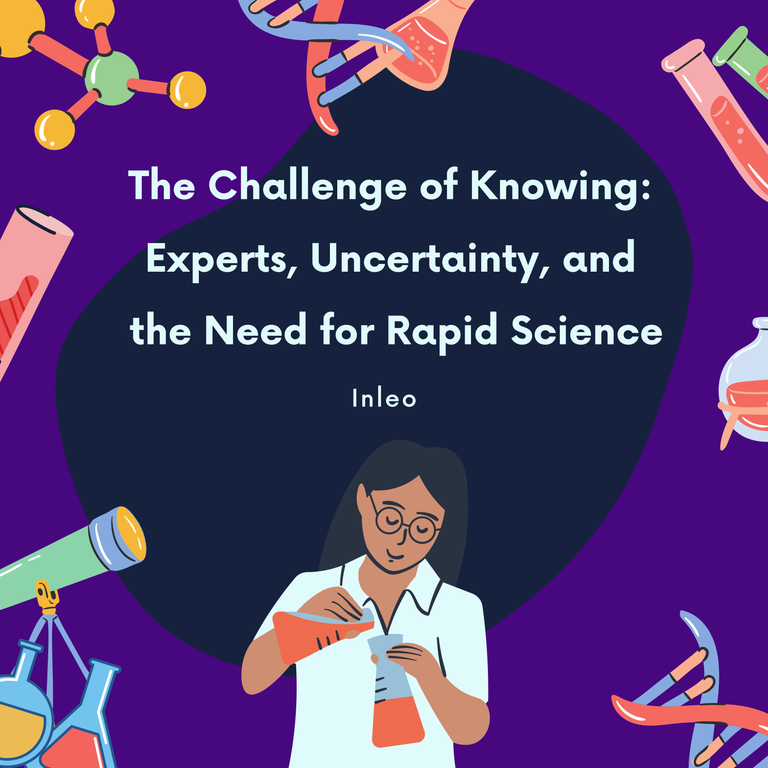The Challenge of Knowing: Experts, Uncertainty, and the Need for Rapid Science

Much of what everyone knows is correct. A great deal of what we know as contemporary humans has been revealed to us by other people. It is common knowledge that Paris is France's resource hub, and that statement is accurate. A rainbow's shape, a particular shade of red light, or the number of letters in the alphabet are all instantly recognizable. In most cases, what everyone knows is right. But what everyone knows isn't always correct. Nobody doubted that people couldn't fly, construct a skyscraper 100 stories tall, or manage a business out of her spare bedroom. Surprisingly, common knowledge is frequently incorrect. On the other hand, discrimination is quite challenging.
Thus, we depend on professionals. In most cases, experts are right. Professionals devote their lives to mastering just a few key areas to truly understand a subject. You can trust that what they say is true. On rare occasions, nevertheless, specialists are mistaken. On top of that, it's not uncommon for another expert to take a different, sometimes opposing, professional take on the same subject. Therefore, those who aren't experts must choose which experts to believe.
Experts should be used cautiously in two situations: when things are changing rapidly and when trying to predict the future. Specialists tended to be significantly more conventional when asked about potential breakthroughs in their field. It was difficult for them to envision improbable events because they knew more than anybody else about the problems and difficulties. The specialists in that field were usually incorrect about the dates in the years after those predictions whenever made-up inventions came to fruition.
Things are scooting, which is another area where experts frequently make mistakes. Most professionals, if not all of the best, wait for a scientific consensus, which can take some time. Much work remains in testing hypotheses, collecting data, and integrating it into the scientific community. An agreement takes too little time to form when issues are fresh and moving quickly.
A non-expert needs help deciding what (and how) to think about artificial intelligence because it is rapidly developing. As with many large fields, the crypto industry comprises professionals with divergent views. The general population has a hard time wrapping their heads around that kind of thinking.
When consensus is lacking during times of upheaval, people often resort to unusual solutions. This could have negative consequences because many unusual ideas are entirely incorrect, some are conspiratorial, and many are just plain ridiculous. But sometimes, the common understanding needs to be corrected. Therefore, we must be receptive to unconventional ideas. Concurrently, when specialists agree, it's probable that what everyone knows is correct.
To initiate the clunky mechanism of scientific research and achieve a consensus of experts, we do not now have very advanced mechanisms for the beginning of expertise that are moving at a fast enough pace. Can we learn anything from their experience to help us find reliable experts in other fields? Was there a specific characteristic, setting, or approach that they used? Quick scientific research could go in different directions than slow scientific research, which is what I'm suggesting. Scientists' actions may improve the chances of perfection during rapid adjustment. Given the nature of scientific research—good science—we fully comprehend that not everyone can be correct. Unconventional ideas must be included in the system. How can we quickly reach a proto-consensus without ignoring the actual set that all we know is wrong? A fantastic skill in the real world is the capacity to undertake rapid scientific research.

Posted Using InLeo Alpha
Congratulations @lucidlucrecia! You have completed the following achievement on the Hive blockchain And have been rewarded with New badge(s)
Your next target is to reach 3500 comments.
You can view your badges on your board and compare yourself to others in the Ranking
If you no longer want to receive notifications, reply to this comment with the word
STOPCheck out our last posts:
Hello.
There is reasonable evidence that this article is machine-generated.
We would appreciate it if you could avoid publishing AI-generated content (full or partial texts, art, etc.).
Thank you.
Guide: AI-Generated Content = Not Original Content
If you believe this comment is in error, please contact us in #appeals in Discord.